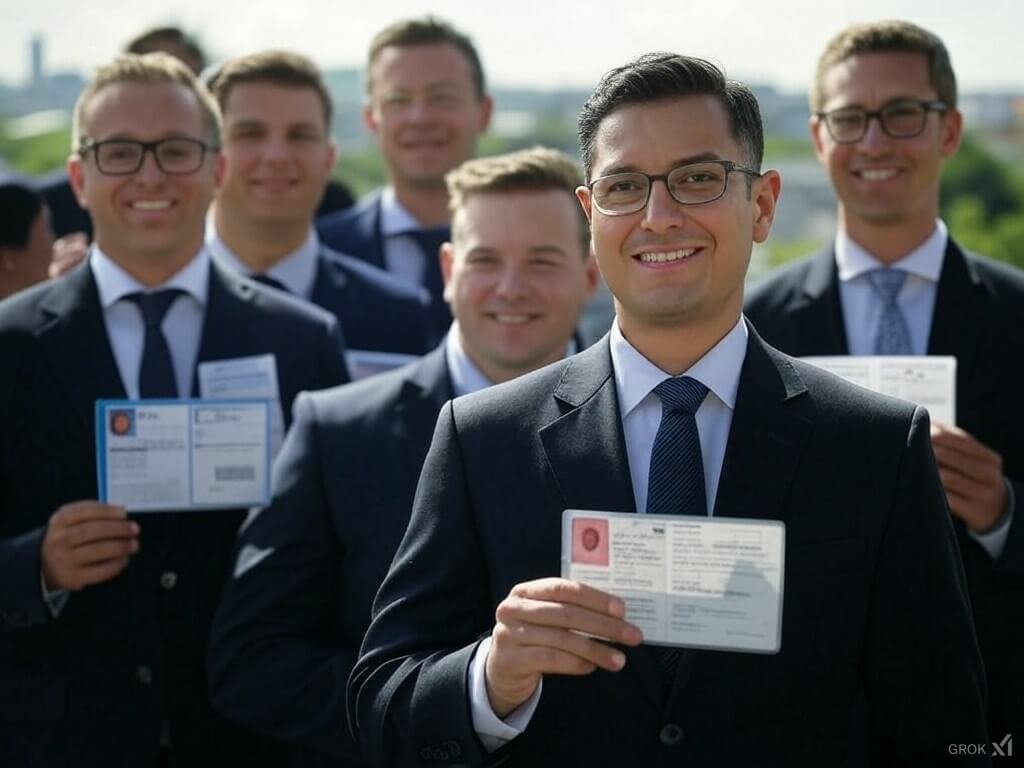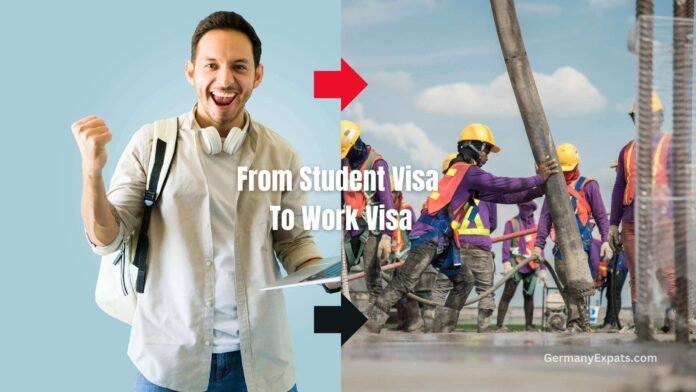Navigieren Sie die Reise von einem Studentenvisum für ein Arbeitsvisum in Deutschland kann eine entmutigende, aber auch lohnende Erfahrung sein. Angesichts der florierenden Wirtschaft und der enormen Möglichkeiten in Deutschland ist dieser Übergang ein wichtiger Schritt zum Aufbau einer Karriere in einem der dynamischsten Länder Europas. Dieser Leitfaden bietet einen umfassenden Plan, um einen reibungslosen und erfolgreichen Übergang zu gewährleisten.
Die Grundlagen verstehen
Der Übergang von einer Studentenvisum Zu Arbeitsvisum in Deutschland ist für viele internationale Studierende ein natürlicher Schritt. Deutschland ermutigt Hochschulabsolventen,s zu bleiben und zur Belegschaft beizutragen. Dieser Prozess erfordert jedoch das Verständnis spezifischer Anforderungen und Zeitpläne.
Berechtigungskriterien für den Wechsel zu einem Arbeitsvisum
- Studienabschluss: Um ein Arbeitsvisum zu beantragen, müssen Sie ein anerkanntes Studium in Deutschland. Stellen Sie sicher, dass Ihre Universität akkreditiert ist, da dies eine wichtige Voraussetzung ist.
- Gültiger Aufenthaltstitel: Achten Sie bei einem Studentenvisum darauf, dass Ihre Aufenthaltserlaubnis während der Arbeitssuche und des Übergangsprozesses gültig bleibt. Wenn Ihr aktuelles Visum bald abläuft, können Sie ein 18-monatiges Visum zur Arbeitssuche beantragen.
- Job in Ihrem Studienfach: Sie müssen einen für Ihr Studienfach relevanten Arbeitsplatz finden. Der Arbeitsplatz muss Ihren Qualifikationen entsprechen und den deutschen Arbeitsstandards entsprechen.
Möglichkeiten des Postgraduiertenstudiums in Deutschland
Nach Abschluss Ihres Studiums in Deutschland stehen Ihnen verschiedene Möglichkeiten zur Verfügung, den Berufseinstieg oder die Weiterführung Ihrer Ausbildung zu erleichtern.
Eine wichtige Option für Arbeitssuchende ist die Erlangung einer befristeten Aufenthaltserlaubnis. Diese Erlaubnis ermöglicht es internationalen Absolventen bleiben in Deutschland für bis zu 18 Monate, während sie nach einem Job in ihrem Studienfach suchen. Während dieser Zeit können Absolventen Stellenangebote finden, Vorstellungsgespräche führen und Kontakte zu potenziellen Arbeitgebern knüpfen.
Um sich für diese Stelle zu qualifizieren, müssen die Kandidaten bestimmte Zulassungskriterien erfüllen. Arbeitsuchende Visum. Dazu gehört in der Regel ein gültiger deutscher Abschluss oder ein gleichwertiger ausländischer Abschluss, der in Deutschland anerkannt wird, der Nachweis finanzieller Stabilität, um sich während der Arbeitssuche selbst zu versorgen, und Krankenversicherungsschutz.
Sobald Absolventen ein Stellenangebot erhalten, können sie von einer Arbeitssucheerlaubnis auf ein normales Arbeitsvisum oder eine Blaue Karte EU umsteigen. Diese Optionen bieten qualifizierten Arbeitnehmern in der Europäischen Union bessere Rechte und Vorteile. Auf diese Weise können Absolventen wertvolle Arbeitserfahrung in Deutschland sammeln und eine solide Grundlage für eine langfristige Karriere dort schaffen.
Diese Optionen nach dem Abschluss bieten internationalen Studierenden eine großartige Chance, ihre Ausbildung effektiv zu nutzen und in den deutschen Arbeitsmarkt einzusteigen.
Schritte zum Übergang vom Studentenvisum zum Arbeitsvisum
Schritt 1: Bewerben Sie sich für einen 18-monatigen Visum zur Arbeitssuche
Nach Abschluss des Studiums können Sie Ihre Aufenthaltserlaubnis zur Arbeitssuche um bis zu 18 Monate verlängern. Wenden Sie sich hierfür an die Ausländerbehörde Ihres Wohnorts. Bringen Sie wichtige Dokumente mit, wie z. B. einen Abschlussnachweis, eine gültige Krankenversicherung und einen Nachweis, dass Sie während der Arbeitssuche über ausreichende finanzielle Mittel verfügen. Diese Verlängerung kann Ihnen den Übergang vom Studentenleben ins Berufsleben erleichtern.
Schritt 2: Sichern Sie sich ein Stellenangebot
Nutzen Sie Plattformen wie StepStone Und LinkedIn um Arbeitsmöglichkeiten zu finden. Stellen Sie sicher, dass Ihr Arbeitsvertrag den deutschen Mindestlohngesetzen entspricht, um ein Arbeitsvisum zu erhalten.
Schritt 3: Beantragen Sie ein Arbeitsvisum oder eine Blaue Karte EU
Sobald Sie ein Stellenangebot haben, können Sie auf ein Arbeitsvisum umsteigen oder sich für das prestigeträchtige EU Blaue KarteLetzteres bietet zusätzliche Vorteile, wie vereinfachte Aufenthaltsverfahren und die Möglichkeit, in anderen EU-Ländern zu arbeiten.
Schritt 4: Besorgen Sie sich die erforderlichen Dokumente
Um einen reibungslosen Übergang von einem Studentenvisum zu einem Arbeitsvisum zu gewährleisten, müssen Sie die offizielle Website besuchen oder sich an diese allgemeine Dokumenten-Checkliste.
Schritt 5: Nehmen Sie an Ihrem Termin bei der Ausländerbehörde teil
Vereinbaren Sie einen Termin mit dem Ausländerbehörde um Ihre Bewerbung einzureichen. Bringen Sie alle erforderlichen Unterlagen mit und seien Sie darauf vorbereitet, Fragen zu Ihren Beschäftigungs- und Karriereplänen zu beantworten.
Tipps zur Jobsuche für Absolventen

Polieren Sie Ihren Lebenslauf
Die Einhaltung deutscher Einstellungsstandards ist bei der Vorbereitung Ihres wieder aufnehmen für den deutschen Arbeitsmarkt. Heben Sie die Fähigkeiten und Erfahrungen hervor, die mit Ihrem Studienfach zusammenhängen, um einen starken Eindruck zu hinterlassen. Wir haben einen schönen Leitfaden über die Deutscher Lebenslauf das Sie unbedingt lesen müssen; es bietet wertvolle Einblicke und Tipps, die Ihnen dabei helfen, sich abzuheben.
Aktiv netzwerken
Besuchen Sie Karrieremessen und Alumni-Events. Plattformen wie XING und Berufsverbände können Ihnen dabei helfen, Kontakt zu potenziellen Arbeitgebern aufzunehmen.
Lernen Sie die deutsche Sprache
Obwohl viele Jobs auf Englisch verfügbar sind, erhöhen Deutschkenntnisse Ihre Beschäftigungsaussichten erheblich. Erwägen Sie Sprachkurse bei Goethe-Institut.
Hauptvorteile der Umstellung auf ein Arbeitsvisum
1. Möglichkeiten für einen langfristigen Aufenthalt
Wechsel vom Studentenvisum zum Arbeitsvisum in Deutschland ist der erste Schritt zur ständiger Wohnsitz. Sie haben möglicherweise Anspruch auf eine Niederlassungserlaubnis, nachdem Sie 33 Monate lang eine Blaue Karte EU hatten.
2. Zugang zu Sozialleistungen
Inhaber eines Arbeitsvisums zahlen in das deutsche Sozialversicherungssystem ein und haben so Anspruch auf Krankenversicherung, Renten und Arbeitslosenunterstützung.
3. Karrierewachstum
Deutschlands robuste Wirtschaft und die vielfältigen Branchen bieten enorme Chancen für den beruflichen Aufstieg.
Geschichten von internationalen Studierenden, die erfolgreich den Übergang geschafft haben

Ahmed, Absolvent des Software-Engineerings von der Technischen Universität MAnach Vom Studentenvisum bis zum Arbeitsvisum können Sie sich für eine Niederlassungserlaubnis in Deutschland qualifizieren.. Ahmed stammt ursprünglich aus Ägypten und kam 2018 nach Deutschland, um seinen Master in Informatik. Während seines Studiums nahm er aktiv an Hackathons teil und absolvierte Praktika bei SAFT Und Siemensund sammeln Sie wertvolle Branchenerfahrung.
Herausforderungen, denen Ahmed gegenüberstand
Trotz seines starken Hintergrunds stieß Ahmed auf mehrere Hindernisse:
- Aufgrund mangelnder Deutschkenntnisse ist es schwierig, eine Vollzeitstelle zu finden.
- Verständnis für bürokratische Anforderungen und Visumantrag Prozesse.
- Konkurrenzkampf auf dem Tech-Arbeitsmarkt in Berlin.
Wie Ahmed diese Herausforderungen bewältigte
- Um seine Kommunikationsfähigkeiten zu verbessern, nahm er an einem Intensivkurs Deutsch am Goethe-Institut teil.
- Verwendet Jobportale wie LinkedIn um sich auf Stellen im IT-Bereich zu bewerben.
- Teilnahme an Networking-Events und Kontakte zu Fachleuten durch XING, eine deutsche Networking-Plattform.
Ahmeds Rat für zukünftige Bewerber
- Beginnen Sie so früh wie möglich mit dem Erlernen der deutschen Sprache, auch wenn in Ihrem Bereich überwiegend Englisch gesprochen wird.
- Durch Praktika und Studentenjobs Branchenerfahrung gesammelt.
- Seien Sie hartnäckig und nutzen Sie die Karrieredienste Ihrer Universität, um Ihren Lebenslauf und Ihre Bewerbungsunterlagen zu verfeinern.
Ahmed sicherte sich erfolgreich eine Softwareentwickler Position bei Deutsche Bank in Berlin und wechselte zu einem Arbeitsvisum. Heute ist er auf dem besten Weg, eine unbefristete Aufenthaltserlaubnis zu beantragen. Deutschlands Fachkräftemigration Programm.
Hinweise für zukünftige Bewerber
- Beginnen Sie frühzeitig mit der Jobsuche, um Stress durch das Ablaufen Ihres Visums zu vermeiden.
- Vernetzen Sie sich über Veranstaltungen und Online-Plattformen mit Fachleuten aus Ihrem Bereich.
- Betrachten Sie Praktika als Sprungbrett in eine Vollzeitbeschäftigung.
- Bleiben Sie über die deutschen Einwanderungsgesetze und -bestimmungen auf dem Laufenden.
Ressourcen und Unterstützung für Arbeitssuchende in Deutschland
Einen Job in Deutschland zu finden kann eine Herausforderung sein, aber es gibt zahlreiche Ressourcen, die internationalen Studierenden und Absolventen helfen erfolgreicher Übergang von einem Student Visum zum Arbeitsvisum in Deutschland.
1. Jobportale und Online-Plattformen
- Mach mit in Deutschland – Offizielles Regierungsportal für internationale Arbeitssuchende.
- StepStone – Eine der größten Jobplattformen Deutschlands.
- LinkedIn – Berufliches Networking und Jobsuche.
- In der Tat Deutschland – Suchen Sie nach Jobs in verschiedenen Branchen.
- XING – Eine deutsche Networking-Site, die für die Jobsuche nützlich ist.
2. Karriereberatung an Universitäten
Die meisten deutschen Universitäten bieten Karriereberatung, Lebenslaufprüfungen und Unterstützung bei der Arbeitsvermittlung an. Erkundigen Sie sich bei Ihrer Universität Karrierezentrum für Workshops und Arbeitgeber-Networking-Events.
3. Bundesagentur für Arbeit
- Offizielles Stellenportal der Regierung: Arbeitsagentur
- Bietet Arbeitsvermittlung und Karriereberatung an.
- Bietet in bestimmten Fällen finanzielle Unterstützungsmöglichkeiten für Arbeitssuchende.
4. Professionelle Networking-Events und Jobmessen
- Jobmessen – Ein Verzeichnis bevorstehender Jobmessen in Deutschland.
- Tech-Jobmessen – Für IT- und Engineering-Profis.
- Branchenspezifische Karrieremessen deutscher Universitäten und Berufsverbände.
5. Sprachlernunterstützung
- Goethe-Institut – Deutschkurse weltweit.
- Deutsche Welle – Kostenlose Online-Ressourcen zum Deutschlernen.
- Tandem – Eine Sprachaustausch-App zur Verbesserung der deutschen Konversationsfähigkeiten.
6. Expat- und Berufsgemeinschaften
- Internationales – Networking für Expatriates in Deutschland.
- Meetup – Finden Sie lokale Berufsgruppen und berufsbezogene Veranstaltungen.
- Universitäts-Alumnigruppen – Knüpfen Sie Kontakte zu ehemaligen Studierenden, die den Übergang ins Berufsleben in Deutschland erfolgreich geschafft haben.
FAQs
1. Kann ich nach meinem Abschluss mit meinem Studentenvisum Vollzeit arbeiten?
Ja, Sie können während der 18-monatigen Arbeitssuche Vollzeit arbeiten, sofern dies Ihrem Studienfach entspricht.
2. Welches Mindestgehalt ist für die Erteilung einer Blauen Karte EU erforderlich?
Ab dem Jahr 2025 liegt die Mindestgehaltsgrenze bei 58.400 Euro jährlich. Für Mangelberufe reduziert sie sich auf 45.552 Euro.
3. Wie lange dauert das Verfahren zur Erlangung eines Arbeitsvisums?
Der Vorgang kann 4-8 Wochen dauern, abhängig von der Arbeitsbelastung Ihres lokalen Ausländerbehörde.
Abschluss
Der Übergang von einer Studentenvisum zum Arbeitsvisum in Deutschland ist eine lohnende Reise, die Türen zu unzähligen Möglichkeiten öffnet. Sie können diesen Übergang erfolgreich meistern, indem Sie die Anforderungen verstehen, Ihre Schritte sorgfältig planen und die verfügbaren Ressourcen nutzen. Egal, ob Sie eine Karriere im Ingenieurwesen, in der IT, Gesundheitspflegeoder jedem anderen Bereich: Deutschland heißt qualifizierte Absolventen willkommen, die bereit sind, einen Beitrag zu seiner dynamischen Wirtschaft zu leisten.

